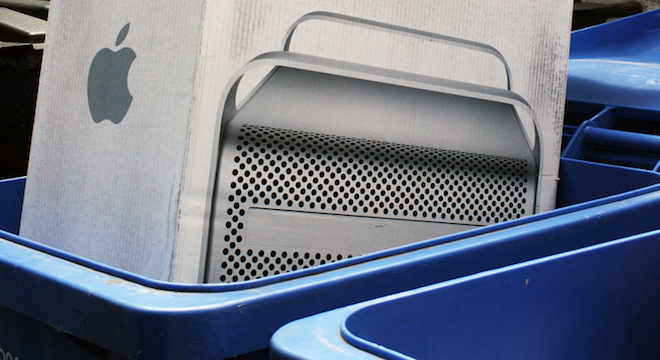Updated 7:45 p.m. ET, Tuesday, July 17
Apple, a company not known for publicly admitting to missteps, did just that on Friday when the company announced it had made a “mistake” in leaving a nonprofit registry group called EPEAT, which rates goods based eco-friendliness and ease of recyclablility after use.
As Apple senior vice president of hardware engineering Bob Mansfield wrote in a statement on Apple’s website:
We’ve recently heard from many loyal Apple customers who were disappointed to learn that we had removed our products from the EPEAT rating system. I recognize that this was a mistake. Starting today, all eligible Apple products are back on EPEAT.
Apple abandoned the EPEAT registry and de-listed all 39 products it had previously certified, which included current and former products, according to The Wall Street Journal, reportedly because the glued-in battery of Apple’s new Macbook Pro with Retina display wasn’t in complaince with EPEAT.
Glued-in products are more difficult to safely and sustainably disassemble than those held together with screws and other mechanical fasteners.
Backlash was swift and fierce, with some large organizational customers reconsidering or dropping their purchase plans for Apple devices. San Francisco city officials told the Wall Street Journal that they would stop buying Apple products going forward, and Politico reported that federal officials were considering ceasing new purchases as well.
Now Apple says its relationship with EPEAT is “stronger than ever.” EPEAT, for its part, agrees.
“Our relationship with Apple is based on our natural alignment – as Apple drives innovation in product design, EPEAT drives innovation in standards design,” said EPEAT CEO Robert Frisbee in statement posted on the organization’s website on Friday.
In fact, Apple, which had throughout the controversy argued it was committed to environmental sustainability through its own internal product recycling program, said that the EPEAT standard, a set of requirements collectively known as IEEE 1680.1, could and should actually be made stricter.
Frisbee also offered a compliment to Apple’s products in EPEAT’s make-up note, writing that: “An interesting question for EPEAT is how to reward innovations that are not yet envisioned with standards that are fixed at a point in time.”
Greenpeace, the environmental advocacy group which had earlier in the week released a separate report grading the eco-friendliness of the energy used in Apple’s data centers and finding them to be lacking, but better than last year’s energy mix, also released a statement applauding Apple for returning to EPEAT.
“We applaud Apple for ‘thinking green, not greedy’ and listening to its customers’ calls not to pit design needs against the environment,” wrote Greenpeace IT analyst Casey Harrell in a statement sent to reporters. “A large and growing number Apple customers have challenged the company to be an environmental leader, whether that be by rejoining EPEAT, eliminating toxic chemicals from its products, or powering its iCloud with renewable energy.”
As Apple pointed out in its statement Friday, and Greenpeace also acknowledged, the company has been a leader in raising environmental standards for the consumer technology industry. specifically in discontinuing use of brominated flame retardants (BFRs) and polyvinyl chloride (PVC) chemicals in making the iPhone.
“The concept of designing for the environment is something they’ve done,” said David Pomerantz, a Greenpeace spokesman, in a phone interview with TPM. “I think Apple is a smart company. It’s gotten to where it has been today by listening to its customers. When it sees that customers want iPhones and computers that are recyclable and environmentally friendly, and want to use an iCloud powered by clean energy and not coal, I hope they react positively and return to the position of environmental leadership that they’re capable of.”
Corrections: This article originally mischaracterized EPEAT as an “industry registry group,” when in fact, the computer industry, though a part of the organization, is just one of several stakeholders, including environmental advocates, purchases, government representatives and researchers, among others.
This post also originally incorrectly omitted the word “not” in front of the word “coal” in Pomerantz’s quote. We have since updated the references in copy to correct them and apologize for the errors.






